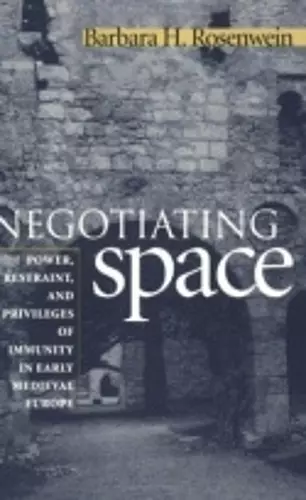Negotiating Space
Power, Restraint, and Privileges of Immunity in Early Medieval Europe
Format:Hardback
Publisher:Cornell University Press
Published:26th Jan '99
Currently unavailable, and unfortunately no date known when it will be back
This hardback is available in another edition too:
- Paperback£27.99(9780801485213)

Why did early medieval kings declare certain properties to be immune from the judicial and fiscal encroachments of their own agents? Did weakness compel them to prohibit their agents from entering these properties, as historians have traditionally believed? In a richly detailed book that will be greeted as a landmark addition to the literature on the Middle Ages, Barbara H. Rosenwein argues that immunities were markers of power. By placing restraints on themselves and their agents, kings demonstrated their authority, affirmed their status, and manipulated the boundaries of sacred space.
Rosenwein transforms our understanding of an institution central to the political and social dynamics of medieval Europe. She reveals how immunities were used by kings and other leaders to forge alliances with the noble families and monastic centers that were central to their power. Generally viewed as unchanging juridical instruments, immunities as they appear here are as fluid and diverse as the disparate social and political conflicts that they at once embody and seek to defuse. Their legacy reverberates in the modern world, where liberal institutions, with their emphasis on state restraint, clash with others that encourage governmental intrusion. The protections against unreasonable searches and seizures provided by English common law and the U.S. Constitution developed in part out of the medieval experience of immunities and the institutions that were elaborated to breach them.
An unconventional new contribution.... Rosenwein's line of thought opens up entirely new vistas of interpretation to historians as she reads between the lines of apparently dry-as-dust material hitherto relegated to diplomatic and legal history, and finds vitally important power politics and enormous creativity lurking behind its demurely formal record.... Beyond its stated subject of the ordering of space, Rosenwein's book suggests that creativity and ingenious power politics are as characteristic of troubled times as of peaceful prosperity.
-- Aline G. Hornaday * Journal of Unconventional History *Anyone who has picked up a volume of early medieval charters has encountered an immunity diploma. Anyone who has read Barbara Rosenwein's wonderful book will never read an immunity the same way again. This is one of the most interesting and important books I have read in many years.
-- Thomas F. X. Noble * Arthuriana *In this able and thought-provoking book... Rosenwein investigates her case studies with her customary disciplined scholarship and sensitivity to nuance. There is much absorbing material to ponder here, not only about the workings of power relationships in early medieval societies but also about notions concerning holy places, gift-giving, purity, defilement, protection, and asylum.... There are lessons to be learned in all sorts of directions.... Historians will find challenging food for thought in Rosenwein's pages.
-- Richard Fletcher * Times Literary Supplement *Our understanding of how early-medieval Europe functioned as a secular and a religious community is greatly enhanced by this splendid monograph.... A superb study.
-- Harry Rosenberg * Speculum *Readers will learn much from this book about monastic privileges in the early Middle Ages. Rosenwein has taken a subject that has been in the bailiwick of continental scholarship and introduced it to an English-speaking audience with style and wit.
-- Kenneth Pennington, Syracuse University * American Historical Review *Rosenwein has produced another original and ambitious study of a topic with wide-ranging implications. One of its greatest merits is that it seems likely to provoke readers to thought and, with luck, to further research on some of the issues that it raises.
-- James A. Brundage * Church History *While it is essential reading for anyone interested in questions of law, power, and politics in the early Middle Ages, Rosenwein's forays into anthropological literature and Anglo-American legal history recommend this work to a wider audience.
-- Adam J. Kosto * Law and History Revi- Winner of One of Annales's Best Books of 1999.
ISBN: 9780801435232
Dimensions: 229mm x 152mm x 27mm
Weight: 907g
304 pages